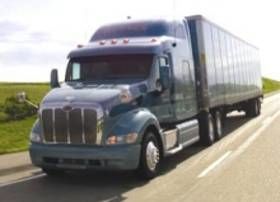Tanker Or Dry Van?
Topic 16246 | Page 2
Renegade's Comment

8 years, 12 months ago
Brett, as always, you and the experienced guys make it easy to understand where the new guys should start in this field of work.
New Reply:
New! Check out our help videos for a better understanding of our forum features
Bold
Italic
Underline
Quote
Photo
Link
Smiley
Links On TruckingTruth
Done

















Done
0 characters so far - 5,500 maximum allowed.
Notify Me Of New Comments
Submit
Preview
Preview:
Submit
Cancel








 TT On Facebook
TT On Facebook
Maybe a dry bulk tanker if that's what you're referring to. Like hauling flour, sugar, sand, etc. But a food grade tanker without baffles is a whole world of difference from a dry van. When you have 50,000 pounds of liquid sloshing around with nothing on the inside to slow it down it can be incredibly difficult and dangerous to deal with.
We used to haul saltwater out of Chicago down to Des Moines and the liquid was so heavy it barely filled the tank a little over halfway. But the viscosity of water is so low it sloshes everywhere. Those loads were brutal. If you had to hit the brakes a little harder than you wanted to you knew you were gonna get blasted when that wave hit the front of the tank. I've had it literally knock my hat right off my head and completely clear the shelves in the bunk scattering everything all over the cab.
I wouldn't suggest a new driver start out in a food grade or chemical tanker. A dry bulk tanker is fine though.
Baffle:
A partition or separator within a liquid tank, used to inhibit the flow of fluids within the tank. During acceleration, turning, and braking, a large liquid-filled tank may produce unexpected forces on the vehicle due to the inertia of liquids.Dry Van:
A trailer or truck that that requires no special attention, such as refrigeration, that hauls regular palletted, boxed, or floor-loaded freight. The most common type of trailer in trucking.HOS:
Hours Of Service
HOS refers to the logbook hours of service regulations.